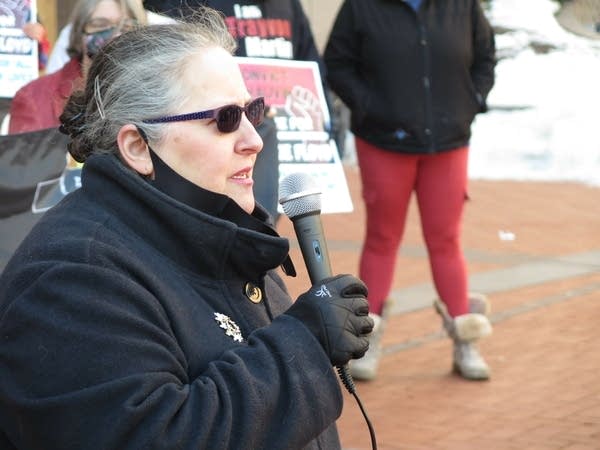Some critics of MPD not sold on proposal to overhaul public safety system
Some of the most vocal anti-police brutality activists are skeptical that the proposal to replace MPD with a public safety department will resort in any real change.

Go Deeper.
Create an account or log in to save stories.
Like this?
Thanks for liking this story! We have added it to a list of your favorite stories.
Minneapolis residents have been deluged with mailers and flyers from groups who favor or oppose a ballot question that would replace the Minneapolis Police Department in the city’s charter with a new Department of Public Safety.
Advocates, many of whom have been pushing for major changes in policing since before George Floyd was killed by a police officer last year say the charter amendment will allow the city to revamp public safety. But some other longtime anti-police brutality activists are skeptical that it will bring about any sort of real change.
Michelle Gross has long been on the front lines of fighting against police misconduct in Minneapolis. Her organization, Communities United Against Police Brutality, does everything from organizing rallies to lobbying city and state legislators to pass laws designed to hold police accountable.
Some might be surprised that Gross would oppose the charter amendment to create a new Department of Public Safety. But she worries it would just be the same police department with a different name.
Turn Up Your Support
MPR News helps you turn down the noise and build shared understanding. Turn up your support for this public resource and keep trusted journalism accessible to all.
“I understand the yearning, I truly do understand the yearning and desire to make concrete change,” Gross said. “The problem is all the things that could have done that, have never been tried.”
Gross admits that police reforms in the city have mostly failed over the last two decades, but said she’s also worried that the amendment's structure that gives the City Council more oversight over policing would create more bureaucracy and lead to even less accountability.
“[The City Council] have not taken budget measures they could have taken to address police misconduct, in fact they’ve given the cops more money, not less,” Gross said. “So when they talk [that] silly talk about defunding, dismantling, all that, in fact, they’ve done the exact opposite — so I have no trust in the City Council.”

However, JaNaé Bates of Yes 4 Minneapolis, which is pushing for question 2, blames forces like the police federation for blocking changes in the past. She sees the amendment as an opportunity to create a new structure that activists and community members can continue to build on once it passes.
”This amendment is actually a first step towards putting that power back into the hands of the city,” Bates said. “The hope is that when this passes that organizations ... can also see their ways to be able to leverage some of that to make more of what they’ve been pushing for possible.”
Some other social justice advocates haven't decided if they'll campaign for or against the amendment.
Nekima Levy Armstrong is a longtime civil rights advocate and attorney who heads up the Racial Justice Network. She said she isn’t yet ready to publicly announce her stance on ballot Question 2. Armstrong is hosting a forum Monday night on the issue. But she’s been skeptical of the City Council’s role and critical about the lack of a concrete plan.
Bates, of Yes 4 Minneapolis, said the charter sets the rules for the city, but doesn't typically contain detailed plans for each agency. She said ordinances created later along with community engagement efforts would outline the day-to-day workings of the new Department of Public Safety.
“The opposition takes it and they spin it as a no plan,” Bates said. “But of course the plan is to have real engagement, and not to just ram down the throats of the people — what a handful of folks think should happen.”
The main opponent to the measure is a group calling itself All of Mpls.
The Twin Cities Coalition for Justice 4 Jamar is an activist group founded in the wake of Jamar Clark’s killing by a Minneapolis police officer in 2015. Organizer Jae Yates said they’re hoping to get their own amendment on the ballot next year that would institute civilian control over the police.
”We mainly see [question 2] as kind of an ultimately pointless stopgap, unfortunately,” Yates said. “The Yes 4 Minneapolis people, I’m sure their hearts are in the right place — but in this case, this is really only going to make it hard to actually have police accountability.”
Yates of Justice 4 Jamar said most members of his group plan to vote no, although they’re not campaigning against the ballot measure.
”We’re not going around being like, ‘if you vote for question 2, you’re a bad person,’” he said. “But we do think it’s important for voters to be informed, but quite frankly Yes 4 Minneapolis has gotten a lot of the support they’ve gotten based on things that are not actually part of their legislation.”
Bates, of Yes 4 Minneapolis, said lots of people who support organizations like Justice 4 Jamar are also supporting the efforts of her group.
“In the end, organizations like this, we are not each other’s enemy, and most often we’re fighting on the same side,” Bates said. “We’re all trying to make those continuous strides to bend that arc towards justice — and it takes a multipronged approach to get there.”
Early voting in Minneapolis on ballot question 2 has already started. Election Day is Tuesday, Nov. 2.


